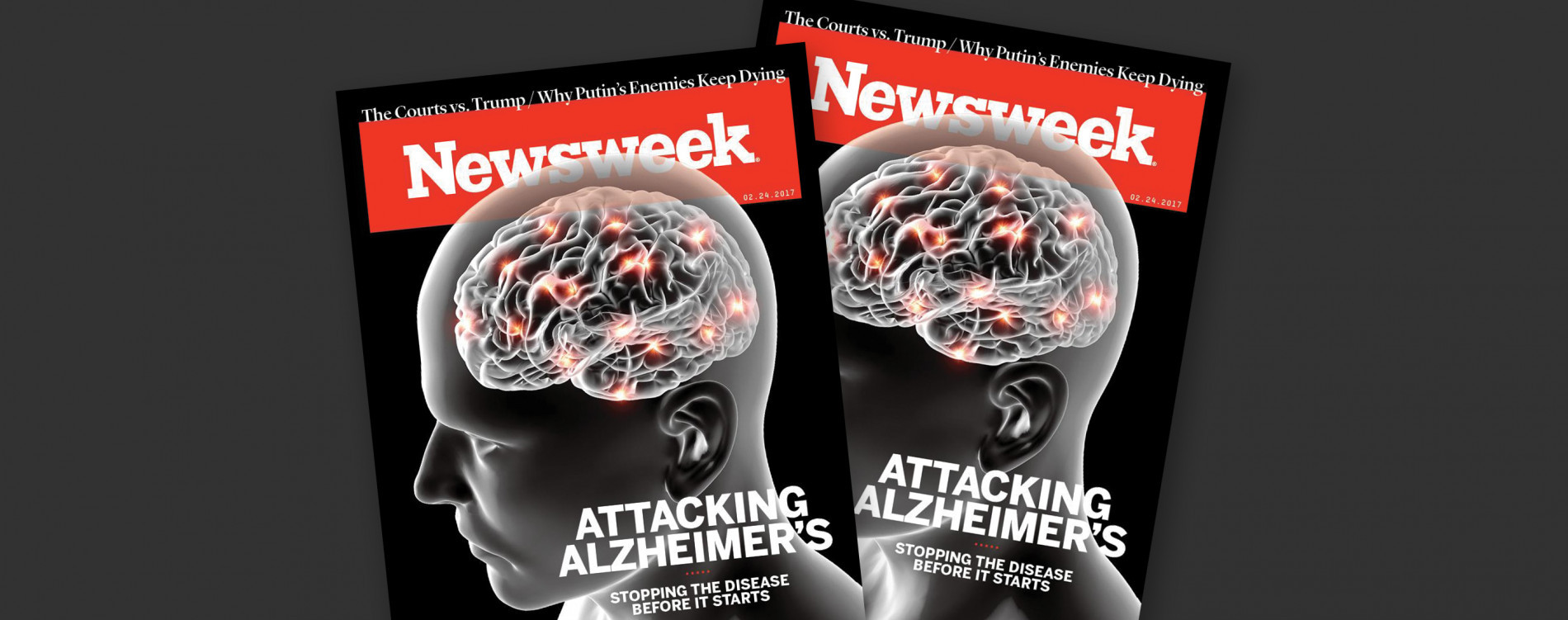Our Founding Executive Director and Chief Science Officer Dr. Howard Fillit talked to Newsweek for its February 24, 2017, cover story, "The New Offensive on Alzheimer's Disease: Stop it Before it Starts." The article highlights the importance of clinical trials for the prevention of Alzheimer's disease. Investing in this work is a critical part of our mission at the Alzheimer's Drug Discovery Foundation.
Thanks to new diagnostic tools including the ADDF-supported Amyvid™ PET scan, beta-amyloid plaques and other hallmarks of Alzheimer's can be seen years and perhaps even decades before patients experience dementia symptoms. This presents an opportunity for early intervention. Dr. Fillit says that one approach involves "halting the disease at the pre-dementia stage when only mild cognitive impairment (MCI) is evident." Patients with MCI are still high functioning with no dementia. But they have some symptoms, including memory loss, so insurance companies are more likely to cover potentially expensive treatments at this stage.
The article focused exclusively on clinical trials using anti-amyloid drugs—some of which have already failed in patients with MCI or mild to moderate Alzheimer's. At the ADDF, we are advancing trials exploring more novel approaches to prevention. Dr. Michela Gallagher, a professor at Johns Hopkins University and co-founder of Agenebio, is preparing for a phase 3 trial of a drug that targets brain hyperactivity in patients with MCI. In earlier studies, the drug appeared to restore memory and slow the progression of MCI enough that patients never develop Alzheimer's disease. At Rockefeller University, Dr. Ana Pereira is conducting a phase 2 trial of riluzole, an FDA-approved ALS drug that appears to clear excess glutamate from the brain and preserve neurons. Dr. Pereira is also testing her drug in patients with MCI.
We also support trials that are taking wholly different approaches, looking at risk factors and the prevention potential of common medications. The ADDF partnered with Dr. Deborah Blacker at Harvard to contribute new information to the Alzheimer's Modifiable Disease Risk Database, for example on the relationship between statins and dementia risk. Dr. Galit Weinstein and Dr. Lenore Launer are looking at available data to determine whether people treated with specific medications for diabetes and hypertension, respectively, have a lower dementia risk. And Dr. Sandra Black at the University of Toronto is going a step further, conducting a clinical trial to evaluate whether the treatment of hypertension with one medication instead of another could slow the progression of Alzheimer's disease. With the information from these studies, doctors will be able to prescribe the right medication to millions of patients with diabetes or hypertension and dramatically reduce their odds of getting Alzheimer's.
The ADDF is providing even more information on possible therapies to prevent dementia and preserve brain health on our site CognitiveVitality.org. Our scientists review the evidence for and against strategies to promote brain health—everything from supplements to diets and lifestyle choices—and provide easy to understand ratings and blog posts. The site is updated regularly as new research emerges.
In the article, our grantee Gregory Petsko of Weill Cornell Medicine says: "Pretty much every family is going to have a relative affected by Alzheimer's, and that’s going to change the way we live, the way we think, the way we plan for our future—everything." At the ADDF, we are planning on a future in which everyone enjoys a vital, full life without the effects of dementia, and prevention is an important part of realizing that vision.
